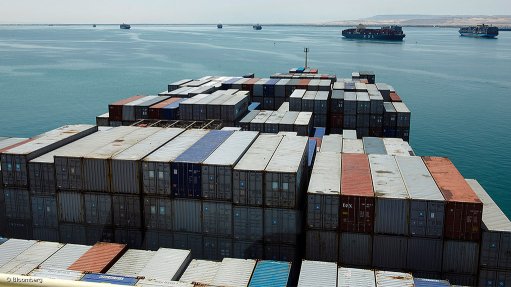
Photo by: Bloomberg
South Africa needs to attract ships to its national register or continue forking out R44-billion a year to foreign operators, Deputy Transport Minister Sindisiwe Chikunga said on Thursday.
Speaking at a Transport Forum discussion on maritime issues, in Johannesburg, she explained that 300-million tons of cargo passed through South Africa’s nine ports – with 98% of the nation’s trade done by sea – but not one cargo-carrying vessel flew a South African flag.
Only about 1 600 vessels, mostly fishing and harbour boats, were on the country’s national maritime register. It was essential for South Africa to attract commercial shipping vessels owned by local companies.
“We need to face the hard realities [that there is a lack of home-grown commercial vessels],” she said, particularly in light of the country incurring maritime costs of R44-billion a year on foreign vessels.
There was a need to create a vibrant shipping industry and create the thousands of seafaring and related maritime jobs expected of a thriving maritime sector, Chikunga noted, adding that South Africa had the maritime infrastructure and scale in place.
Further, having its own ships would mitigate the impact on the industry of relying on foreign vessels.
“South Africa must have its own fleet [and] we need to discuss how best to acquire [this],” the Deputy Minister noted.
As of January 2014, a new tax regime, eliminating taxes such as capital gains and dividends, was introduced with the objective of developing the country’s maritime sector.
Previous reports indicated that South Africa was the only country in the Brazil, Russia, India, China and South Africa economic grouping, known as Brics, not to have its own ships.
The Department of Transport recommitted to accelerating the finalisation of the Maritime Transport Policy, which would revitalise the maritime industry and would continue efforts to make it attractive to fly the national flag.
South African Maritime Safety Authority CEO Commander Tsietsi Mokhele added that a strong incentive to build the sector was that 60% of South Africa’s gross domestic product was sourced through trade.
“If 98% of South Africa’s cargo is seaborne, then the case has been made,” he stated.
“It weakens your [economic] position if your [national] registry is devoid of ships.”
Further, he indicated that up to 800 000 jobs were linked to the maritime industry.
“Maritime is the future,” he stressed.
Chikunga stated that the South African government recognised the need for skills development and the establishment of a domestic maritime university, developed in collaboration with all stakeholders, was proposed.
In the interim, an agreement had been secured with several countries, including Poland, to source skills when required.